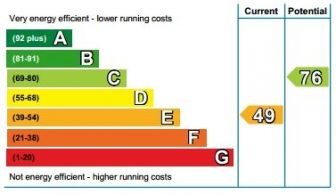 More than half of – 52% – of landlords with properties that require improvements to upgrade their energy efficiency ratings with incoming regulations have considered selling, according to a new report.
More than half of – 52% – of landlords with properties that require improvements to upgrade their energy efficiency ratings with incoming regulations have considered selling, according to a new report.
A survey conducted by The Mortgage Works (TMW) comprising 600 landlords found those with affected properties felt they would not be able to complete or finance the works needed in the time set out by the government.
The government has suggested a change to the law requiring all new rental tenancies to have a minimum rating of C and above by 1 April 2025, while existing tenancies, which must now have an EPC rating of E or above, will have to meet this target by 2028.
Those with larger portfolios were more likely to consider selling, with 58% of landlords with six to 10 properties saying that they had thought about offloading some or all of their properties. This figure rose to 63% landlords with 20 or more properties.
Just over a third – 35% – of landlords with one property said they thought about disposing of their asset.
Daniel Clinton, head of lending at The Mortgage Works, said: “With currently less than four years before all new tenancies need to be in properties rated EPC C or above, there are still landlords who need to undertake remedial work on at least one of their properties. They are therefore understandably concerned about how they will both fund the work, find someone to do it and have it completed in time.
“The side effect of these concerns is that a significant number of landlords admit they are ready to give up and already considering selling properties.
“An unintended consequence of this sentiment could result in a backwards step in meeting the government’s target around climate change, for example, if these properties are taken up by the owner occupier market, where there are currently no minimum energy efficiency requirements.
“Working with the sector to understand how best to help landlords improve the energy efficiency of their properties and the timeframe within which they can do this may ultimately lead a better outcome for everybody.”
On the back of The Mortgage Works’ report released yesterday, Propertymark has expressed concerns.
Propertymark policy and campaigns manager Timothy Douglas said: “As domestic energy use accounts for 14 percent of overall UK emissions and 90% of homes in England currently use fossil fuels, improving the energy efficiency of the nation’s housing stock is one of the most significant challenges in reaching net zero emissions.
“If the alarming number of landlords who have considered selling up within the TMW report go on to do so, it will have a detrimental effect on not only the government’s ambitions to reach net zero, but also for the thousands of renters looking to be housed as stock levels deplete.
“In some parts of the market, this will put additional burdens on local authorities and increase demand for social rented housing as not everyone can afford to buy.
“To support the longevity of the private rented sector, the government must introduce realistic and achievable targets that take into account the diversity of the country’s housing stock. Furthermore, without incentives and sustained funding options that landlords can tap into, it is unlikely that the government’s proposals for energy efficiency will be met.”


Odd why council and housing associations are not included. So Victorian houses with cladding on the outside and listed buildings with insulation on the inside, solar panels on thatched roofs-classy.
Another nutty scheme from the out of touch Government.
You must be logged in to like or dislike this comments.
Click to login
Don't have an account? Click here to register
I’ve always thought that EPC’s would eventually become a ‘stick to beat us with’ when we reached a critical mass of registered properties. What will be next? Compulsory EPC’s for all property not just those for sale or rent ? Owner occupiers being charged a penal surcharge on their Council Tax if they are below a C ? Upon the sale of a property the new owner to ensure that the property is brought up to a minimum of C within say 5 years or before the next re-sale ? Higher level of Stamp Duty for property under C ? and any other financial penalties you can think off. Property is an easy target for those seeking to assist in the achievement of Zero emissions.
You must be logged in to like or dislike this comments.
Click to login
Don't have an account? Click here to register
“Owner occupiers being charged a penal surcharge on their Council Tax if they are below a C ?”
Somewhere in the archives of EAT you will find me stating exactly this, in 2008 or thereabouts!
You must be logged in to like or dislike this comments.
Click to login
Don't have an account? Click here to register
if you are in an area with lots of Victorian Stock or old properties, then landlords are ********.
We all know over insulating old properties causes damp.
You must be logged in to like or dislike this comments.
Click to login
Don't have an account? Click here to register